Badrinath Dham
Badrinath Dham or Badrinath Temple is a Hindu temple dedicated to Vishnu which is situated in the town of Badrinath in Uttarakhand, India. The temple and town form one of the four Char Dham and Chota Char Dham pilgrimage sites. The temple is also one of the 108 Divya Desams dedicated to Vishnu, who is worshipped as Badrinath—holy shrines for Vaishnavites.
It is open for six months every year (between the end of April and the beginning of November), because of extreme weather conditions in the Himalayan region. The temple is located in Garhwal hill tracks in Chamoli district along the banks of Alaknanda River at an elevation of 3,133 miter above the mean sea level. It is one of the most visited pilgrimage centres of India.
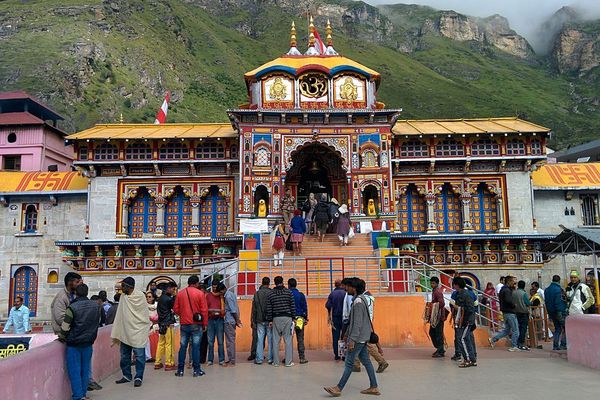
At Badarinath Lord MahaVishnu is believed to have done his penance. Seeing the Lord doing his penance in the open, Goddess Mahalaxmi is believed to have assumed the form of Badari tree to provide him shelter to face the onslaught of the adverse weather conditions, therefore the name Badari Narayan. It is believed that Lord Vishnu revealed to Narad rishi that Nar & Naryans forms were his own. It is also believed that Narad rishi, who also did his penance here, is even now worshipping the supreme God with Ashtakshara mantras.
The image of Badarinarayan here is fashioned out of Saligramam. Badarinarayan is seen under the Badari tree, flanked by Kuber and Garuda, Narad, Narayan and Nar. Mahalakshmi has a sanctum outside in the parikrama. There is also a shrine to Adi Sankara at Badarinath.
Nearest Attractive Places
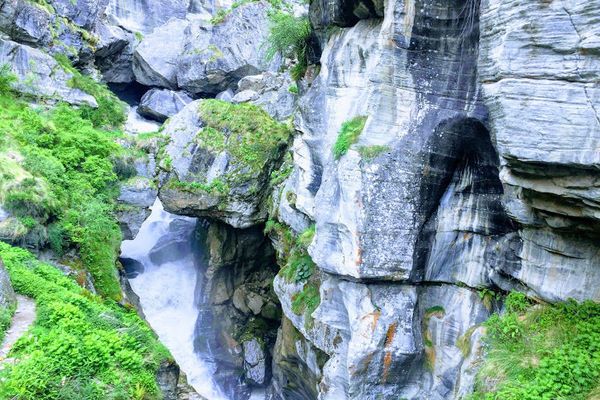
Bheem Pul
Bheem Pul is 3 km from Badrinath and it built over Saraswati River. It is believed that one of the Pandava brothers called Bheema for his beloved wife Draupadi made this natural bridge. Accourding to Hindu mythology, this was the place from where the Pandavas stared their journey to heaven called Swargarohini. During this journey, Draupadi was unable to cross the river than Bheema lifted a huge rock and placed it between the gorge. Later on, it was know as Bheem Pul.
Vasudhara Falls
Vasudhara Falls is a waterfall situated near Badrinath, in Uttarakhand, India. It is located on river “Alaknanda”. Total distance from Badrinath to Vasudhara is 9 km. The first 3 kilometers of badrinath to mana village is drivable road. Next 6 km is walkable trek from Mana village to Vasudhara waterfall. The log inheight of this waterfall is 400 ft.
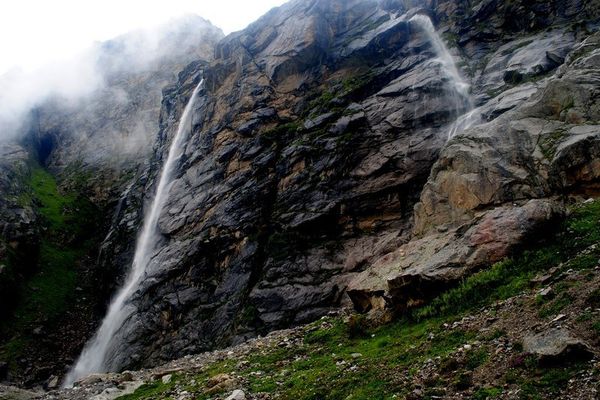
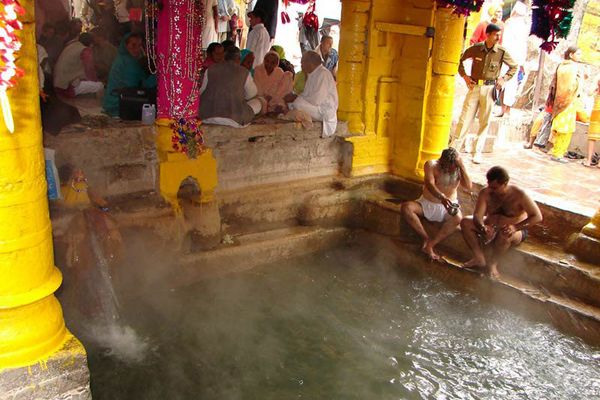
Tapt Kund
Tapt Kund located just below the temple, the meeting point of Alaknanda and Rishi Ganga rivers, this thermal spring of hot sulphurous water has inviting freshwater pool. The bathing area, 16.1/2 feet by 14.1/4 feet, has separate arrangements for men and women. Although the normal temperature is 55°c, the water temperature keeps rising gradually during the day. It is considered to have high medicinal value. A dip here is considered to be a good cure for skin diseases.
Vyas Gufa
The Mana village is full of caves and it is said that Ved Vyas dictated his famous epic of Mahabharat to Ganesh, in one of these caves, now known as Vyas Gufa (cave). Inside is a marble statue of Ved Vyas shown writing the granth (epic book). It Sitauted on the bank of Saraswati River
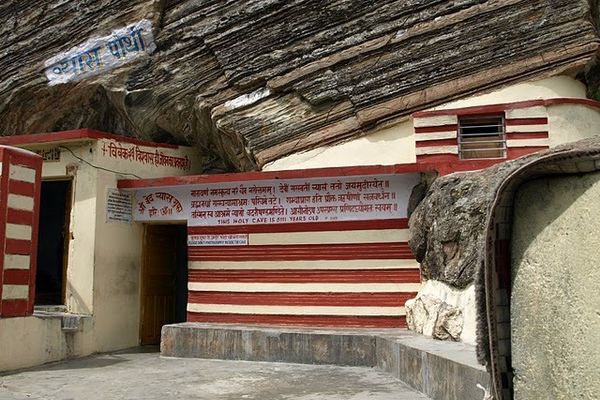
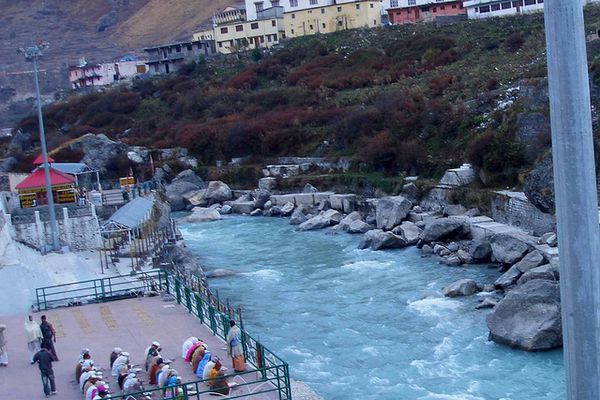
Brahma Kapal
In a quest to ensure a heavenly abode for the dead ancestors, the shradh ceremony (propitiating rites) or the offering of pind is an important part of Hindu rituals. After offering pind here, it is believed, the spirits of the dead are permanently enshrined in Heaven and no more pinds are to be offered elsewhere. The Brahma Kapal, on the bank of the Alaknanda is a flat platform a few yards north of the temple. Legend has it that when Shiva chopped off the fifth head of Brahma, it got stuck to his trident. Lastly with the blessing of Lord Vishnu at Badarivan, the head of Brahma fell down from the trident at this place & hence the name Brahma-Kapal (head).
Ganesh Gufa
Located in close proximity to Vyas Gufa, Ganesh Gufa is said to be the place where Lord Ganesha wrote the epic of Mahabharata while Sage Vyas dictated it to him. It is also the place where the Lord Ganesha broke his tusk to substitute it as a pen that broke while writing Mahabharata.
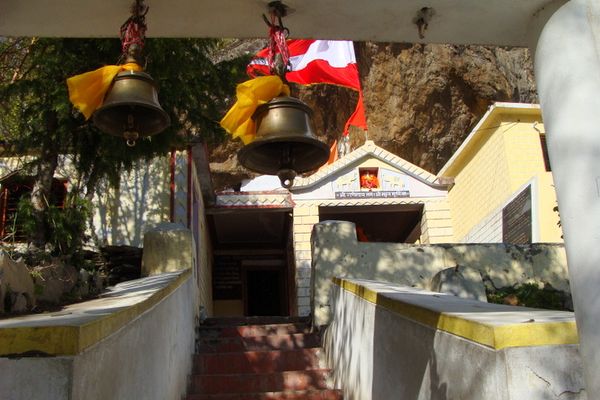
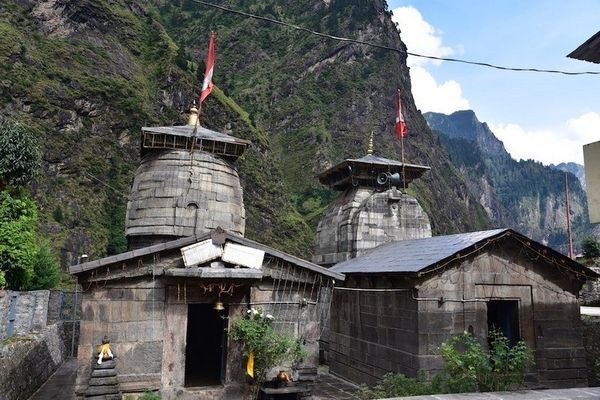
Pandukeshwar
This place is believed to have been established by King Pandu, father of Pandavas. It is situated at 4 kms from Govind Ghat, 219 kms from Kedarnath and 24 kms from Badarinath. There are two temples – one for Lord Yoga Badari Narayan and the other for Lord Vasudev. During winter, Lord Vasudev temple functions as the abode for Lord Badari Narayan and all the daily rituals connected with worship are performed here. Both the temples are centuries old.
Narad Kund
Located near Tapt Kund, this kund is believed to be the recovery source of the Badarinath idol. The hot water springs comes out from beneath the Garur Shila and falls into a tank. Darshan of Badarinath is always preceded by a holy dip in this kund. Apart from that there are many other hot water springs. Devotees take a dip in them for their religious and medicinal value.
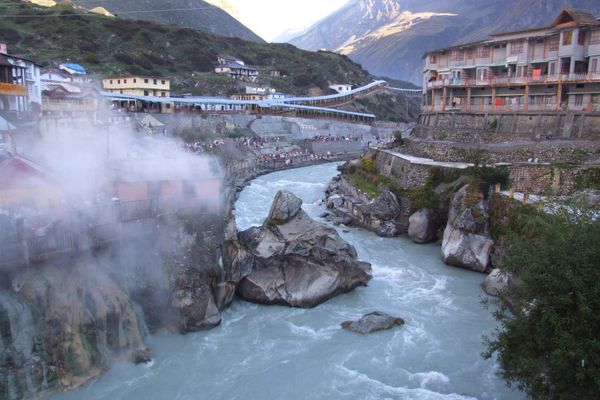
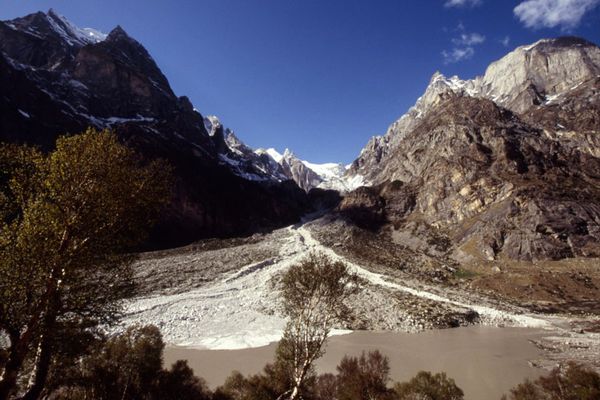
Alka Puri
Alkapuri is the source of river Alaknanda River. It is situated at the base of Balakun Peak at 4600 miter above sea level near Badrinath in Chamoli District of Uttrakhand. he originating point of River Alaknanda, Alka Puri is a glacier which situated at at the base of Balakun Peak. The glacier is said to be the abode of Lord Kuber, Yakshas and Gandharvas. Alka Puri is attached to a glacial plateau that separates it with Gaumukh Glacier.
Valley of Flower
The Valley of Flowers is a high-altitude Himalayan valley that has long been acknowledged by renowned mountaineers, botanists, and in literature. It has been recognized internationally for over a century and is referenced in the Hindu religion. Local people have visited the valley since ancient times. Indian yogis are known to have visited the valley for meditation. The Valley of Flowers has many different colourful flowers, taking on various shades of colours as time progressed. To know more about that click here
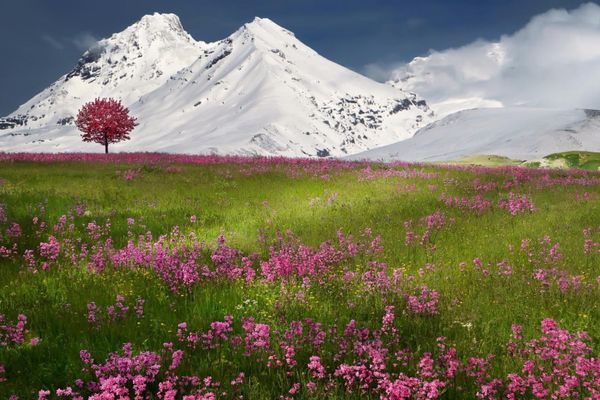
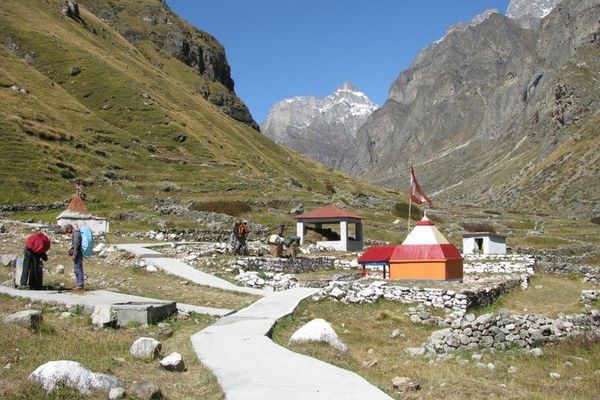
Mata Murti Temple
On the right bank of Alaknanda opposite the Mana village is a small temple of Mata Murti dedicated to the mother of Shri Badarinathji. Once a year on the day of Vamana Dwadashi, the Narain (Badarinathji) pays a visit to Mata Murti, when she is worshipped by the Rawal of Badarinathji and the residents of Mana village organise a festival of prayer, havan & bhog. Belief is that Mata Murti has the power of granting Vairagya to those who sincerely meditate here for a few days.
Mana Village
4 km from Shri Badarinath, inhabited by Indo-Mongolian tribe, it is considered to be the last Indian village boardering Tibet. The villagers of Mana are closely linked with the activities of Shri Badarinath temple for they offer a choli to the deity on the closing day of the temple – an annual traditional feat.Mana sits 3 km away from Badrinath Temple on the bank of River Saraswati. It is an attractive village where one can enjoy stunning views of the surroundings and tea at the last tea stall of the country.
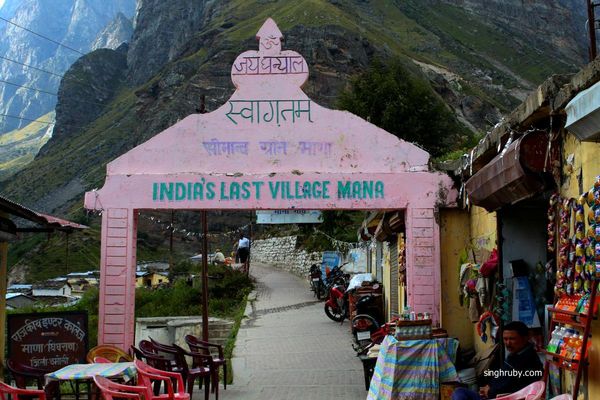
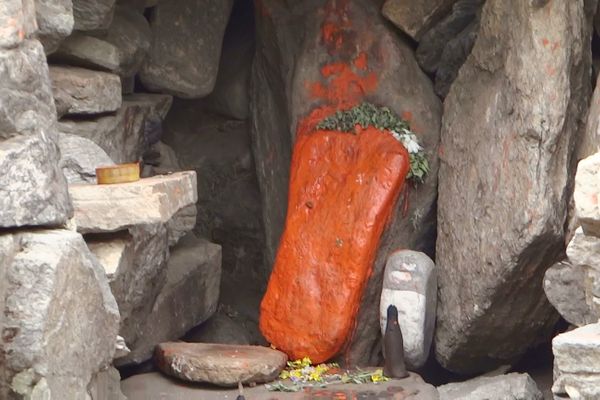
Charan Paduka
From Badrinath, 3 km away is a beautiful meadow carpeted with wild flowers in the summer. Here is a boulder bearing the footprints of Lord Vishnu. It is said that when Lord Vishnu descended from Vaikunth (the heavenly abode of Lord Vishnu) he stepped on this boulder. The area is a steep climb from the town and is full of caves & boulders.
Sheshnetre
On the opposite bank of the river Alaknanda, in the lap of Nar Parvat, there are two small seasonal lakes. Between these lakes is a boulder having an impression of the legendary snake, Sheshnag. The formation of eye on the boulder is natural.
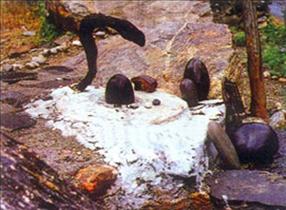
Panch Dharas & Panch Shilas
The Panch Dharas (five streams) which are famous in Badaripuri are Prahlad, Kurma, Bhrigu, Urvashi & Indira dhara. The most striking of these is the Indira dhara, about 1.5 km north of the town Badaripuri. Bhrigudhara flows past a number of caves. The one on the right of river Rishi Ganga, originally from the Neelkanth range is Urvashi dhara. Kurma dhara water is extremely cold whereas Prahlad dhara has lukewarm water, which glides majestically down the rocks of Narain Parvat.
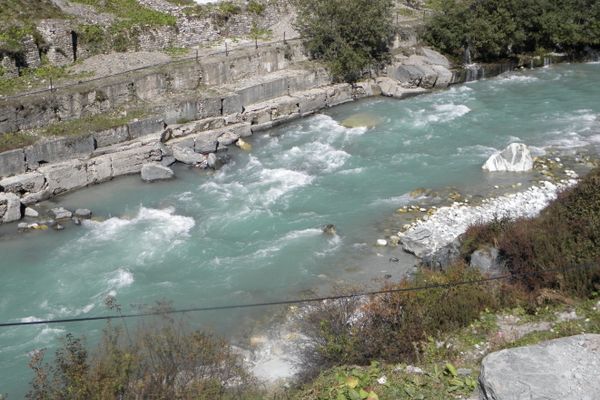
Saraswati
3 km north of Mana village emerges the river Saraswati from a lateral glacier. Saraswati is known as the Goddess of learning, blessed Ved Vyas to compose the epic Mahabharata at Mana. The river after touching Vyas Gufa, gets lost in the Alaknanda at Keshav Prayag. From here to Allahabad, Saraswati flows incognito. It is said that at the confluence of Ganga, Yamuna and Saraswati at Allahabad, the Saraswati remains invisible.
Satopanth Tal
Satopanth Tal is a lake in Uttarakhand, India, located in the midst of snow-capped peaks at an altitude of 4,600 metres (15,100 ft) above sea-level. The lake is considered to be of religious significance to the local people; residents of Manavillage throw the ashes of the dead in the lake. There is a saint known as Moni Baba, for he had stopped talking from a very early time. There is a common belief that he can live on only sun and air, if food is unavailable.
Many people believe that the Trimoortis, viz, Brahma, Vishnu and Mahesh, bathe in the lake in an auspicious day. Also some types of birds are found here, which pick up the pollutants of the lake and thus keep the lake clean. These birds are not found anywhere. The local belief is that they are the Gandharvas disguised, who guard the lake against evils.
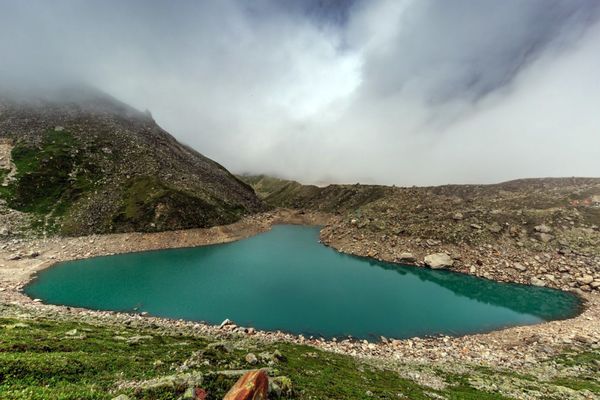
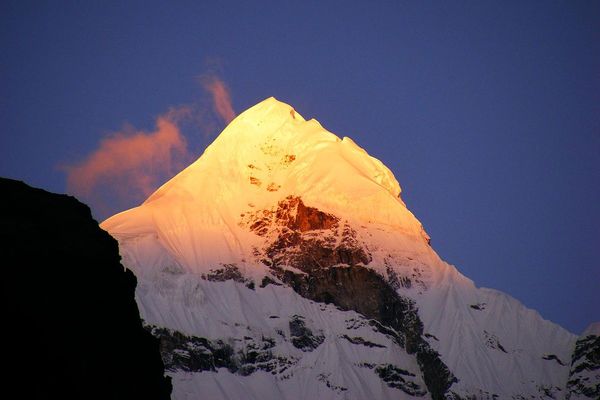
Nilkantha Peak
At the back of the temple, a side valley opens to a conical shaped Neelkanth peak (6600 m.) It is popularly known as the Garhwal Queen. It is a shining pyramid of white crystals, which are ever ready to change their colour & hue. Reflecting the first glow of dawn into the valley & glittering like a golden temple, Neelkanth embodies all the divinity of this divine land
